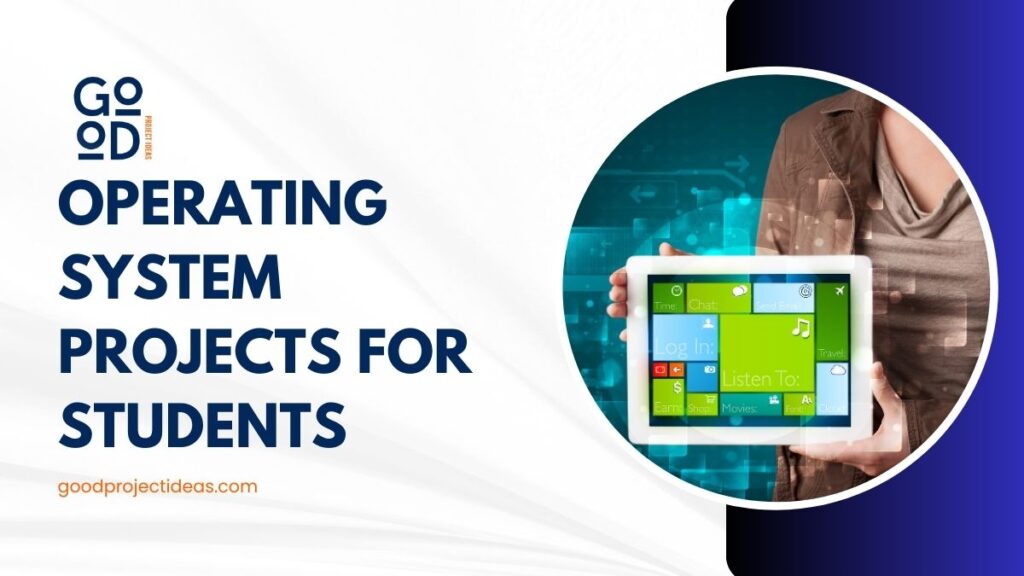Explore engaging operating system projects for students, designed to enhance understanding of computer systems and programming concepts. Hey there! Ever wondered what makes your computer tick? Operating System Projects for Students is your chance to dig deep into the guts of computers.
We’ll explore how they run, play with coding magic, and have a ton of fun along the way. Whether you’re new to this or a seasoned explorer, these projects will turn you into a computer whiz in no time!
The Significance of Operating System Projects
Operating system (OS) projects are like hidden gems for computer science students (CSE), no matter your experience level. Here’s why they’re so cool:
- Hands-On Fun: You get to dive into the heart of OS stuff, like managing processes and memory, turning theory into real fun.
- Peek Inside: OS projects show you how the OS talks to your computer’s hardware, revealing the magic behind computers.
- Boost Your Coding Skills: They help you sharpen your coding skills in languages like C or C++, dealing with system calls and kernel-level things.
- Problem-Solving Wizard: Tackling OS project challenges is like a brain gym, making you ace tough problems with smart solutions.
- Go Advanced: If you’re up for a challenge, dive into kernel development for a deeper understanding of how the OS works.
- Learn Beyond Tech: OS projects teach you project management skills, like planning and meeting deadlines, super useful for future projects.
- Bug Detective: Become a pro at finding and fixing bugs, boosting your problem-solving skills like a champ.
- Unleash Creativity: OS projects are a playground for trying out new ideas and customizing systems, letting your creativity run wild.
- Big Picture Understanding: Dive into why design choices matter in operating systems, gaining deeper insights into computer workings.
In short, OS projects are your ticket to becoming a top-notch CSE student, blending theory with hands-on fun and preparing you for success in the tech world. Dive in and discover your full potential!
Choosing the Right Operating System Projects
Choosing the right operating system (OS) project depends on what you’re into and where you’re at with your skills. Here’s a roadmap to help you find your perfect match:
Know Yourself
- Skill Level: Figure out if you’re starting out or ready for a challenge. Beginners stick to basics, while pros dive into kernel stuff.
- Interests: Pick what excites you – process management, memory magic, or hardware talks.
Exploring Projects
- Beginner Projects:
- Simulators: Play with CPU tricks or memory puzzles.
- File Systems: Create and manage files like a pro.
- Intermediate Projects:
- Device Drivers: Make hardware friends with simple drivers.
- Virtual Memory Fun: Dive into virtual memory worlds.
- Advanced (Kernel) Projects:
- Microkernel Magic: Build a mini OS brain.
- System Call Showdown: Get hands-on with system calls.
Extra Tips
- Online Help: Check out sites like GitHub, GeeksforGeeks, and OSDev Wiki for ideas.
- Blend with Class: Match your project with what you’re learning in class.
- Get Support: Don’t go solo – ask teachers or online pals for help.
The right OS project is like finding your favorite game – challenging, fun, and totally you. So, dive in and enjoy the OS adventure!
Operating System Projects for Students
Check out some of the best operating system projects for students:-
Process Management Projects
- Process scheduling algorithms simulation
- Multi-threaded process scheduling
- Interprocess communication mechanisms
- Process synchronization techniques
- Deadlock detection and prevention
- Real-time process scheduling
- Job scheduling in batch systems
- Process priority management
- CPU scheduling simulator
- Implementation of round-robin scheduling
Memory Management Projects
- Virtual memory simulation
- Page replacement algorithms comparison
- Memory allocation strategies analysis
- Buddy memory allocation system
- Fragmentation analysis and mitigation
- Memory leak detection tool
- Implementing memory segmentation
- Demand paging simulation
- Memory swapping techniques
- Memory mapping in operating systems
File System Projects
- File system implementation from scratch
- File compression and decompression tool
- File versioning system
- File recovery and backup system
- File system encryption and decryption
- Hierarchical file system design
- Implementing file permissions and access control
- File system integrity checker
- File synchronization tool
- File indexing and searching algorithms
Device Management Projects
- Device driver development for a specific hardware
- Interrupt handling mechanisms
- USB device management system
- Network device driver implementation
- Disk I/O scheduling algorithms
- Plug and Play support in operating systems
- Printer spooling system
- Power management strategies
- Device monitoring and diagnostics tool
- Virtual device management simulation
Security and Protection Projects
- User authentication and access control system
- Secure login mechanisms
- Intrusion detection system for OS
- File and directory encryption tool
- Firewall implementation for OS
- Malware detection and removal tool
- Digital signature verification system
- Secure communication channels implementation
- User-level and kernel-level protection mechanisms
- Security audit and logging system
Networking and Communication Projects
- TCP/IP stack implementation
- Network protocol analysis tool
- Socket programming for network communication
- Network packet sniffing tool
- Routing algorithms simulation
- Network bandwidth management system
- Implementing VPN services
- Network performance monitoring tool
- Network configuration management
- Network security protocols implementation
Distributed Systems Projects
- Distributed file system design
- Distributed process management
- Distributed mutual exclusion algorithms
- Replication strategies in distributed systems
- Fault tolerance mechanisms
- Distributed deadlock detection and recovery
- Load balancing algorithms in distributed systems
- Distributed consensus algorithms
- Distributed database management system
- Peer-to-peer file sharing system
Real-Time Systems Projects
- Real-time task scheduling algorithms
- Priority-based scheduling in real-time systems
- Deadline scheduling simulation
- Real-time kernel development
- Real-time data acquisition and processing
- Time synchronization protocols
- Real-time embedded system design
- Fault tolerance in real-time systems
- Real-time operating system benchmarking
- Real-time communication protocols implementation
System Performance Optimization Projects
- System resource utilization monitoring tool
- Performance profiling and analysis tool
- System benchmarking suite development
- CPU and memory usage optimization techniques
- Disk I/O optimization strategies
- Network bandwidth optimization tool
- Cache management algorithms analysis
- System load balancing mechanisms
- Parallel processing optimization techniques
- Virtualization for performance enhancement
Cloud Computing Projects
- Cloud operating system design
- Cloud resource allocation and management
- Virtual machine migration strategies
- Cloud storage system implementation
- Cloud security and privacy mechanisms
- Scalability testing in cloud environments
- Load balancing algorithms for cloud servers
- Cloud-based data analytics platform
- Cloud-based application deployment system
- Hybrid cloud integration strategies
IoT and Embedded Systems Projects
- Embedded operating system development
- IoT device management platform
- Sensor data collection and analysis system
- IoT communication protocols implementation
- Real-time operating system for embedded devices
- Low-power consumption strategies for IoT devices
- Edge computing solutions for IoT
- Firmware development for embedded systems
- IoT security and privacy measures
- IoT gateway implementation
Mobile and Smartphone Projects
- Mobile operating system customization
- App sandboxing and isolation techniques
- Mobile device management system
- Mobile data synchronization tool
- Mobile application virtualization platform
- Mobile device security suite
- Battery life optimization strategies
- Location-based services implementation
- Mobile payment and authentication system
- Mobile augmented reality application development
User Interface and Experience Projects
- GUI toolkit development for OS
- User-friendly command-line interface design
- Accessibility features for OS
- Customizable desktop environment
- Touchscreen interface optimization
- Voice recognition and control system
- Multi-language support in OS
- Adaptive display resolution management
- Gesture-based user interactions
- User experience analytics tool
System Monitoring and Logging Projects
- System log analysis and visualization tool
- Real-time system monitoring dashboard
- Performance metrics collection and reporting
- Anomaly detection in system logs
- Automated system health checks
- Centralized logging system
- Resource usage trend analysis tool
- Event correlation and alerting system
- Log file compression and archiving
- Network traffic monitoring and analysis
Backup and Recovery Projects
- System backup and restoration tool
- Incremental and differential backup strategies
- Disaster recovery planning and simulation
- Automated backup scheduling system
- Cloud-based backup solutions
- Data deduplication techniques
- Backup verification and integrity checking
- Encrypted backup storage options
- Bare-metal recovery solutions
- Version control for backup files
Data Management Projects
- Database management system integration
- Data indexing and searching algorithms
- Data deduplication in storage systems
- Data compression techniques
- Data replication strategies
- Data migration tools and processes
- Data lifecycle management system
- Database performance tuning
- Data warehousing and analytics platform
- Data privacy and security measures
Collaboration and Communication Projects
- Collaboration platform development
- Real-time messaging and chat application
- Document collaboration and versioning system
- Video conferencing system integration
- Project management tool integration
- Virtual team workspace environment
- Workflow automation and orchestration
- Secure file sharing and collaboration
- Remote desktop access solution
- Team collaboration analytics tool
Education and Learning Projects
- Learning management system integration
- Online course delivery platform
- Interactive educational content creation tool
- Student performance analytics system
- Virtual classroom environment
- Adaptive learning algorithms implementation
- Gamification in education software
- Personalized learning pathways system
- Automated grading and assessment tool
- Virtual laboratory simulations
Entertainment and Media Projects
- Media player development for OS
- Multimedia streaming server integration
- Digital content creation and editing software
- Virtual reality content platform
- Augmented reality applications for entertainment
How do I make an operating system project?
Creating your own operating system (OS) from scratch might sound daunting, but it’s a super cool learning adventure! Here’s a laid-back guide to help you kickstart:
Before You Dive In
- Get the Basics: Make sure you’ve got the lowdown on computer stuff like how it’s built, memory handling, and how tasks are managed by an OS. You can hit up textbooks, online courses, or tutorials to get up to speed.
- Pick Your Playground: Choose where you want to build your OS. You can go old school with x86 (a common type of CPU) or play around with emulators like QEMU. Also, grab a comfy text editor or IDE for coding and a compiler like GCC to turn your code into machine language.
Learning by Doing
- Start Easy: Begin with a fun little project to get the hang of things. Maybe create an OS that boots up and flashes a message on the screen, or whip up a simple text-based kernel to handle basic hardware stuff.
- Check Out Tutorial Frameworks: There are cool frameworks like Cosmos that give you a head start with essential kernel features like memory management and handling interruptions. You can build on these to add your own flair.
Building Blocks of Your OS
- Kernel: This is like the heart of your OS, managing all the hardware stuff like memory, CPU, and devices. It does tasks like deciding what runs when and handling stuff like keyboard taps.
- Device Drivers: These are like little translators between your OS and hardware pieces like keyboards, screens, and drives. They help your OS chat with these devices smoothly.
- System Calls: These are like special requests your OS fulfills for programs, like reading a file or showing something on the screen.
Step-by-Step Guide (Made Simple)
- Boot-Up Buddy: Write a small program that loads your kernel into memory when your computer wakes up.
- Kernel Craft Time: Start with the basics of memory management, making sure your OS can give out and take back memory as needed.
- Interrupts Are Your Friends: Set up routines to handle events like someone hitting keys or time ticking away.
- Text Fun (optional): Fancy making a basic command-line interface so folks can talk to your OS? Go for it!
- Hardware Helpers (optional): Write drivers for simple hardware stuff so your OS can do cool things like showing words on the screen or taking keyboard taps.
Remember
- This is just a chilled-out guide, and each step means some fun coding and fixing bugs.
- Start small, set goals you can hit, and build up from there.
- Online guides, tutorials, and hangouts like osdev.org are awesome for tips and support.
Extra Tips
- Break It Down: Slice up your OS project into small chunks so it’s less overwhelming.
- Write It Down: Keep your code clear with comments explaining what’s what. Makes it easier for you and others to understand and tweak later.
- Test and Fix: Keep poking at your code to find and squash bugs. Debuggers are your pals here!
- Building your own OS is a big deal, but with some chill vibes, good resources, and a step-by-step approach, you’ll totally rock it!
Conclusion
Simply put, operating system projects offer a glimpse into the inner workings of computers. Whether you’re drawn to managing programs, memory, or files, there’s a project tailored to your interests.
These endeavors provide practical experience with real-world computer challenges, teaching you to tackle them with finesse. More than just school assignments, they’re hands-on journeys into the realm of computer science and its influence on technology.
Meet Tom Latham from Good Project Ideas! He’s passionate about sparking creativity and making learning fun for all. Tom loves crafting engaging projects that inspire curiosity and hands-on exploration. Join him in bringing ideas to life!



